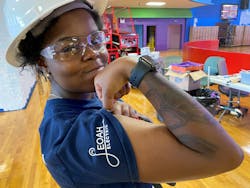Congratulations; it’s official! You just got hired as an electrical apprentice. This is your first day on the job. You’re surrounded by strange thunderous noises, sparks, and unfamiliar smells. Just take it all in. Don't worry about being the new guy or girl — this feeling will eventually pass. You're there because this company needs you on this specific project. They've made a place for you, and you should feel very proud of yourself. Someone decided to take a chance on you and your developing talents.
Now let’s go over a few rules for you to live by as the next few days unfold. I'm giving you advice based on conversations I've had with hundreds of electrical contractors, foremen, and superintendents over the past 20 years. These tips will help you safely navigate your way through the first couple of weeks as you get settled into your new position.
Remember, this job opportunity is the first official investment in what's going to be a long career. Focus on helping the company reach its goals; in return, you will achieve yours. This is a chance to display what you have to offer the company, so make yourself indispensable — just do it without being a nuisance.
When to Ask for Help
Never exaggerate your abilities, past experiences, or skill set[s]. This is one of the most significant pain points contractors experience with new hires. Little white lies can cause damage to property, equipment, and sometimes even fellow personnel. Remember, the boss only gets paid once for installing something. If the work has to be redone, he or she is paying for it to be installed twice.
So, if you don't know how to perform a task, ask for help. Don't worry about looking weak or inexperienced. And don't lose the boss's confidence by telling a lie; use diplomacy, ask for advice, and get it done right the first time. Your foreman or journeyman will take pride in showing you how to do something "the company way."
When "Not" to Ask for Help
On the other hand, never be a drain to the boss’s brain. Bosses are impressed with apprentices who are self-motivated problem-solvers. How do you become one of these people? You have to pay attention to the smallest details of each task you've performed. When you are on the jobsite, watch what your journeyman does and how he does it. Then take mental notes. Be an active learner all day long, and don't ask for help with something you've already done repetitively. Electricians who get promoted within the company make the boss's job easier.
There may be occasions when you find yourself alone on the jobs without guidance. This may occur after you've been an employee for a while, or it could happen right away. Keep in mind this might even be a test. Before you ask for assistance, make sure it's not something you can solve on your own. You can ask technical questions, but try and avoid common-sense questions.
Do your research. One way to problem-solve on your own might be finding a schematic for the equipment you're repairing or installing, looking for the jobsite blueprint, and studying all resources. Find videos or websites that can guide you safely through the installation. If all else fails, then make the call to the boss.
Make it a habit of pushing your brain into more complicated problem-solving exercises. Remember, your brain is a muscle; once you begin to stretch it and push it to new boundaries, those new muscles will stay with you. Staying in your comfort zone will stagnate your career — fear or laziness will pigeonhole you.
Where Your Focus Should Be
Great apprentices always foresee their journeyman’s next step. Focus on anticipating what their next move is. Pass them what’s needed before they need to ask you for it. Great electricians install equipment and terminate conductors with precision, repetitively and consistently. Their work is immaculate and organized; it's their signature. Their tools represent an organized approach to each day and every task.
With so much to learn, there should never be a dull moment during the workday. So tighten up that belt, keep your pants up, and, most of all, put that phone away — no texting on the job!
De Loach, a master electrician and electrical trainer/instructor, is the founder of The Academy of Industrial Arts (www.taia-school.com) in Philadelphia. With more than 30 years of experience in the field, he will be writing regular exclusive content for E-Train and can be reached at [email protected].





